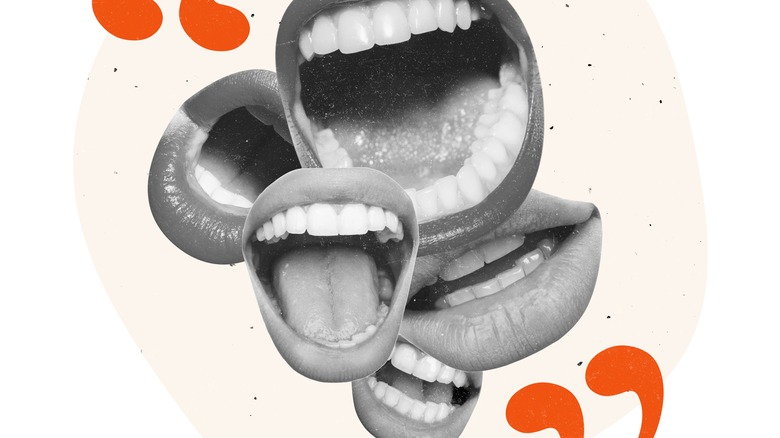The Scientific Reasons Why Tongue Twisters Are So Hard To Say
Say this one five times fast: How can a clam cram in a clean cream can?
If you got through that without a hitch, then congrats on having a useless skill you can bring up at parties. For the rest of us, tongue twisters are unique challenges. But, as it turns out, the blame doesn't lie just with our mouths. Researchers have concluded that tongue twisters actually confound our brains — and have even determined which brain areas are most at fault for the confusion.
A major breakthrough in our understanding of tongue twisters came in 1982, thanks to an experiment conducted by husband-wife research team Ralph and Lyn Haber, according to Mental Floss. For that study, published in the American Journal of Psychology, the duo had college students repeatedly read over some sentences — sometimes out loud, and sometimes in their head. The selected sentences included normal ones as well as tongue twisters.
Unsurprisingly, the Habers found that their subjects took longer, on average, to read tongue twisters than standard sentences when speaking out loud. But, they also found that tongue twisters took longer to read when the subjects were reading silently — that is, only in their heads. This is a curious result, as it suggests that the tongue-twisting nature of these types of sentences has more to do with our brains than our mouths.
Tongue twisters actually twist our brain
Similar experiments have been conducted across various languages, and even with deaf participants, and all have found the same thing: Tongue twisters take longer for our brains to process, as Mental Floss suggests. Why is that? What part of the brain is affected when we're confronted with a tongue twister? A 2003 study sought to figure that out.
That study, published in the journal Brain and Language, used fMRI scanning to examine participants' brains as they silently read through standard sentences and tongue twisters. With the tongue twisters, the researchers found brain activation in unexpected areas. Most critically, they observed activity in the inferior parietal cortex — an area involved in the processing and storage of speech sounds. This suggests that the unusual sound patterns of tongue twisters confuse our brain, causing us to have to re-process the sentences a number of times before we can understand them.
Then, in 2013, an article published in Nature uncovered yet another piece of the puzzle. As Nature Magazine summarizes, the researchers studied three people with epilepsy, all of whom already had electrodes implanted in their brains as part of their treatment. While that's a small sample group, the electrodes allowed the researchers to get highly precise data "on a scale of millimeters and milliseconds" for the three participants.
Which sounds confuse us the most?
For the 2013 study, researchers had the subjects say a variety of different words and sounds, and studied the patterns of neurons that were activated in the brain as a result. They found that consonants and vowels produced very different patterns, according to Nature Magazine. Likewise, the researchers identified three distinct groups of consonants that shared similar brain patterns due to the muscle groups needed to make the sounds: phonemes like "sa", formed near the front of the tongue, "ga," formed at the back, and "ma" made with the lips. They also identified two types of vowels: rounded-lip sounds (like "oo") and the rest (like "aa").
Therefore, the study helps explain why it's easy for us to get consonants mixed up with other consonants, but not with vowels: because we process the two sounds differently in our brains. Even more importantly, this study explains why some consonants, when grouped together, tend to trip us up more than others. If they all fall into the same category (such as back-of-the-tongue sounds), then it's easier for our brain to get them confused.
Edward Chang, one of the researchers, uses the example of "Sally sells sea shells." He points out that both "sss" and "shh" are front-of-the-tongue sounds, so our brain processes them similarly, making us more liable to mix them up. The same isn't true if we compare "sss" to a lip sound like "ma" — which is why "Mally sells sea-smells" is not a tongue twister.


